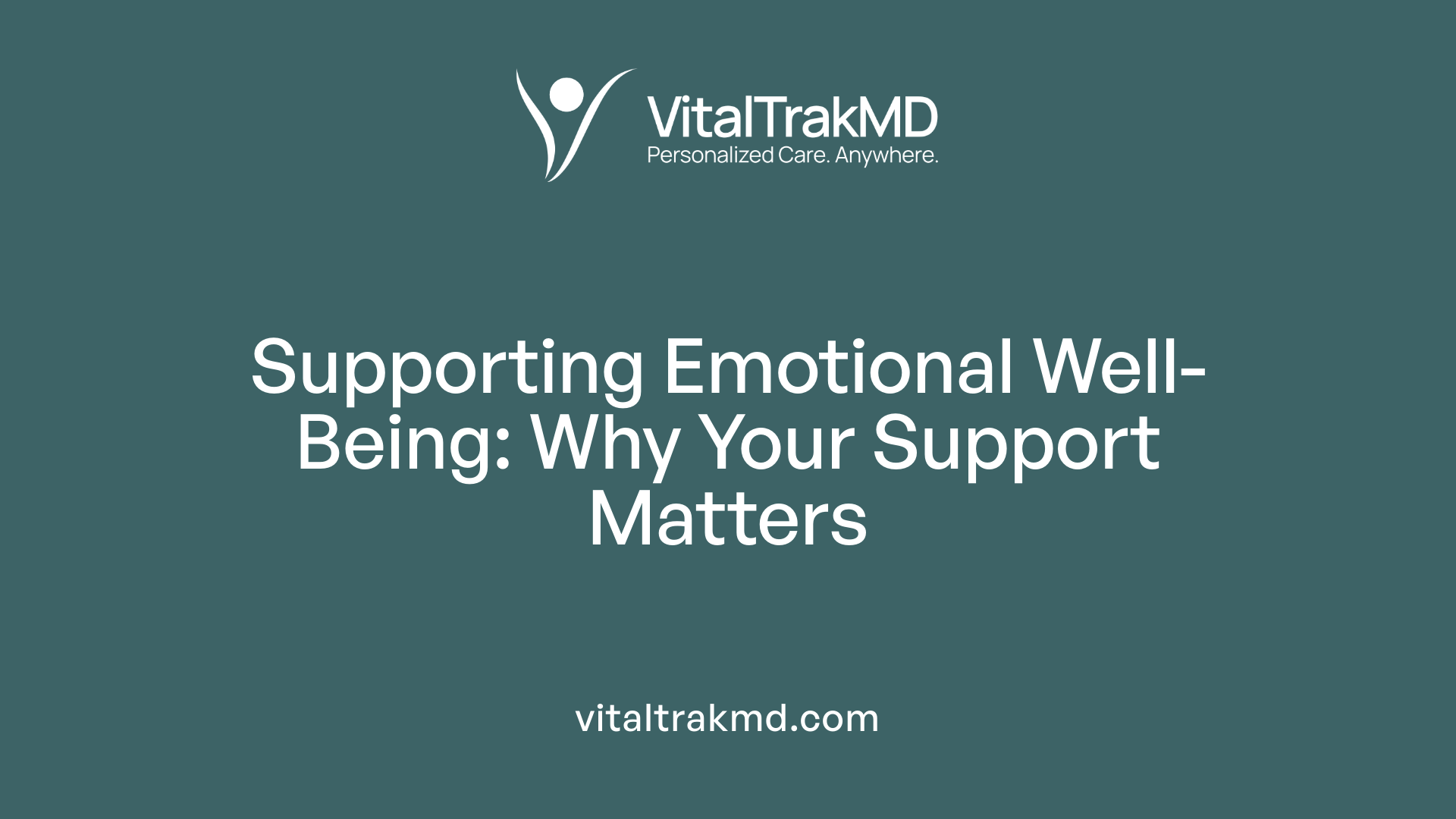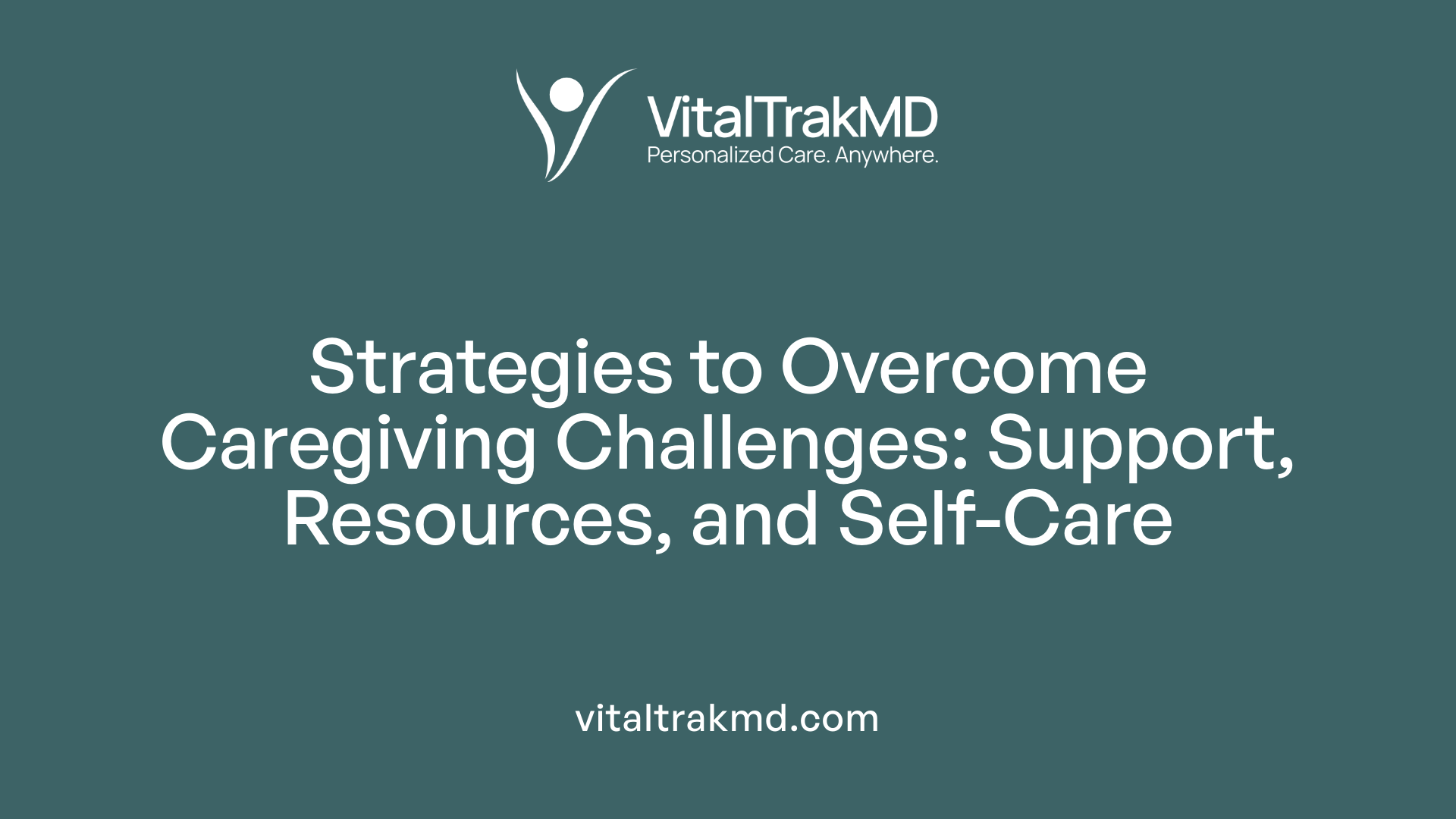A Caregiver’s Story: Managing Mom’s Chronic Illness with VitalTrak

Understanding the Complexity of Chronic Illness Management in Seniors
Caring for a loved one with a chronic illness involves more than just medical management; it encompasses emotional resilience, practical planning, and effective support systems. This article shares insights into the stages of grief experienced by those diagnosed with chronic conditions, highlights the challenges faced by caregivers, and explores practical strategies, including innovative tools like VitalTrak, that empower caregivers to provide quality care while maintaining their own well-being.
The Emotional Landscape: Stages of Grief and Acceptance in Chronic Illness

What are the stages of grief for someone with a chronic illness?
Living with a chronic illness often involves an emotional journey through various stages of grief. Initially, many individuals experience denial, where they may feel disbelief or numbness upon hearing their diagnosis. This stage serves as a buffer, helping them cope with the overwhelming news.
As the reality sets in, feelings of anger can emerge. Patients might question, “Why me?” and may feel resentment towards their situation or even towards loved ones. This anger can be directed at themselves, healthcare providers, or the universe.
Bargaining is another stage that often follows. Here, individuals try to regain control by making promises or engaging in ‘what if’ scenarios, hoping to reverse or lessen their condition. This stage reflects a desire to win back some sense of normalcy.
Depression is a common emotional response, characterized by sadness, withdrawal, fatigue, and a sense of loss. It is a natural part of the grieving process, but it can be challenging to navigate.
Finally, acceptance marks a stage where individuals come to terms with their illness. It doesn’t mean happiness or give up on treatment; instead, it signifies reaching an emotional stabilization and finding ways to adapt and move forward.
Everyone’s emotional response to a chronic illness diagnosis is unique. Recognizing these stages can help patients and their loved ones understand what they’re experiencing and seek appropriate support and coping strategies to manage their feelings effectively.
Why is emotional support important?
Support from healthcare providers, family, friends, and support groups plays a significant role in helping patients process these emotions. Coping strategies such as counseling, mindfulness, and connection with others facing similar challenges can ease the emotional burden.
Understanding that grief is a normal reaction can provide comfort and encourage seeking help when needed. Ultimately, emotional resilience in living with chronic illness depends on tailored support and healthy coping mechanisms, guiding individuals toward acceptance and a better quality of life.
Challenges Faced by Caregivers of Loved Ones with Chronic Illnesses

What are the challenges faced by caregivers of loved ones with chronic illnesses?
Caring for someone with a chronic illness is a demanding role that comes with various hardships. Caregivers often grapple with emotional and physical burdens. Emotionally, they may feel overwhelmed by stress, anxiety, feelings of grief, and guilt as they witness the gradual decline of their loved ones. These emotional reactions can sometimes lead to mental health struggles such as depression.
Physically, caregiving can be exhausting. Tasks like assisting with mobility, managing medications, and performing household chores can cause fatigue and even injuries. Over time, many caregivers neglect their own health, leading to burnout and increased vulnerability to illness.
Socially, caregivers frequently experience isolation. The demanding nature of care can limit their social interactions and strain personal relationships, sometimes leading to feelings of loneliness.
Financial strain is another challenge, especially when caregiving impacts employment or incurs additional expenses for medical supplies and services. Many caregivers also face a lack of adequate training and support. Without proper guidance or resources, they may feel helpless, uncertain about how best to care for their loved ones.
To address these challenges, providing caregiver education, psychological counseling, respite care, and connecting caregivers to community support programs are essential steps. Such measures help maintain their well-being and improve the quality of care they deliver.
| Challenge Type | Common Issues | Strategies to Help |
|---|---|---|
| Emotional Burden | Stress, anxiety, grief | Support groups, counseling |
| Physical Exhaustion | Fatigue, injuries | Respite services, physical therapy |
| Social Isolation | Relationship strain | Community engagement, social activities |
| Financial Strains | Lost income, expenses | Financial planning, assistance programs |
| Lack of Support | Training, resources shortages | Caregiver education, resource linkage |
Strategies and Tools for Effective Care Management
What strategies can help caregivers manage their loved ones' chronic illnesses effectively?
Caregivers play a crucial role in managing the health of elderly loved ones with chronic conditions. One of the most effective strategies is obtaining thorough education about the specific illness. This knowledge helps caregivers recognize symptoms early, understand treatment plans, and make informed decisions.
Support networks are also vital. Caregiver support groups, whether local or online, provide emotional comfort and practical advice. Sharing experiences with others facing similar challenges can reduce feelings of isolation and offer useful coping tips.
Using health management tools like VitalTrak can streamline care. These tools help track medication schedules, appointments, symptoms, and changes in condition, ensuring no detail is overlooked.
An understanding of the Spoon Theory can greatly benefit caregivers. This concept explains how chronic illnesses often deplete a person’s limited energy reserves, symbolized as spoons. Recognizing this helps caregivers prioritize tasks, balance activity with rest, and avoid burnout.
Finally, working closely with healthcare professionals to create personalized care plans ensures that individual needs are addressed comprehensively. These plans typically include medication management, lifestyle adjustments, and regular health monitoring, promoting optimal health outcomes.
How does the Spoon Theory help caregivers of those with chronic illnesses?
The Spoon Theory offers a simple yet powerful visualization for understanding energy limitations associated with chronic illnesses. It helps caregivers recognize that their loved ones may have a finite number of ‘spoons’ or energy units each day. This awareness assists in planning daily activities, emphasizing the importance of conserving energy for essential tasks.
By understanding and applying the Spoon Theory, caregivers can better communicate with their loved ones about their energy levels, adjusting expectations and avoiding overexertion. It fosters empathy by highlighting the invisible challenges faced by those with chronic conditions.
Adopting this concept promotes a more compassionate approach to caregiving, emphasizing quality over quantity of activity and supporting mental and physical well-being. Overall, the Spoon Theory empowers caregivers to create balanced routines that respect their loved ones’ limits, leading to more effective and empathetic care.
Practical Tips for Caregivers in Daily Management of Chronic Conditions
 Managing a loved one’s chronic illness can be overwhelming, but adopting practical strategies makes the process more manageable.
Managing a loved one’s chronic illness can be overwhelming, but adopting practical strategies makes the process more manageable.
One of the most important steps is maintaining organized medical records. Keeping all health information, including test results, medication lists, and treatment plans, in a dedicated file helps ensure nothing is overlooked.
Utilizing health tracking tools and platforms, like VitalTrak, can also be highly beneficial. VitalTrak offers a comprehensive way to monitor medications, appointments, symptoms, and vital signs, fostering better communication with healthcare providers and early detection of health changes.
Engaging actively with healthcare professionals and support groups provides emotional support and practical advice. Support communities offer shared experiences and encouragement, which are invaluable for caregivers.
Prioritizing self-care is crucial. Caregivers should maintain a balanced diet, include regular physical activity, get enough rest, and practice stress-reducing techniques such as meditation, yoga, or deep breathing exercises.
Knowing personal limits and seeking help when overwhelmed are essential. This might involve arranging respite care, asking family members for assistance, or tapping into local community resources.
Recognizing the importance of emotional well-being, caregivers can also benefit from sharing feelings with trusted friends or support groups to prevent burnout and remain resilient.
| Tips for Effective Caregiving | Details | Additional Insights |
|---|---|---|
| Stay organized | Keep medical records in one place | Prevents missed information |
| Use health tracking tools | Monitor medications and symptoms regularly | Helps catch issues early |
| Engage with professionals | Regular check-ins and support groups | Provides emotional and practical support |
| Practice self-care | Maintain a healthy diet and exercise | Reduces stress and boosts energy |
| Know your limits | Seek help when needed | Avoid burnout and promote well-being |
Overall, these approaches support both the caregiver’s and the patient’s health, contributing to better management of chronic illnesses and improved quality of life.
Mother’s Perspective and the Value of Quiet Moments in Caregiving
How does emotional and spiritual connection benefit caregiving?
Rosa Hopkins, a mother who manages her own chronic illness, highlights the importance of emotional and spiritual bonds in caregiving. She believes that being present and emotionally available creates a strong foundation of trust and love with her daughter. These connections go beyond physical care and foster a sense of security and understanding.
Despite health limitations, Rosa finds that sharing quiet moments and simple activities can be deeply meaningful. These interactions reinforce her relationship with her child, making her feel connected and fulfilled. For caregivers, recognizing the significance of emotional connection can transform caregiving from a stressful responsibility into a source of joy.
How can celebrating simplicity influence motherhood?
In Rosa's experience, celebrating the simplicity of motherhood—such as sharing quiet time or engaging in gentle activities—brings profound happiness. Her focus on these moments allows her to nurture her child's emotional well-being without the pressure of physical exertion. This approach emphasizes the importance of quality over quantity, especially when health challenges restrict physical activity.
By embracing simplicity, caregivers can reduce stress and foster stronger bonds. Rosa's story shows that motherhood does not have to be about grand gestures; instead, it thrives on sincere, everyday interactions rooted in love and presence.
What is the impact of chronic illness on parenting?
Chronic illnesses can sometimes limit a parent's ability to engage in active play or outdoor activities. Rosa shares that her health issues mean she cannot always participate in physically demanding parenting tasks like running or playing actively with her daughter. Despite this, she maintains a deep emotional connection through shared quiet moments.
Managing health concerns while parenting requires adaptability and a focus on emotional intimacy. Rosa’s example illustrates that even with health limitations, meaningful parent-child relationships can flourish through patience, understanding, and attention to emotional needs.
Rosa’s Personal Journey with Health and Motherhood
Rosa Hopkins, who has a chronic illness, describes how her health challenges have shaped her approach to motherhood. Instead of focusing on physical activities, she emphasizes being present and emotionally available for her young daughter.
Her daughter, content with quieter activities, reflects Rosa’s belief that love and connection matter most. Rosa celebrates the simplicity of motherhood—cherishing the quiet moments that strengthen their bond.
Her story underscores that managing a chronic illness does not diminish the capacity for love and meaningful connection. It highlights the resilience and adaptability that caregivers demonstrate, turning health challenges into opportunities for deeper emotional bonds.
| Aspect | Details | Additional Notes |
|---|---|---|
| Emotional Support | Promotes trust, love, and security | Vital for caregiving, especially with health issues |
| Simplicity in Care | Focus on quality moments | Reduces stress, enhances bonds |
| Impact of Illness | Limits physical activities | Encourages emotional closeness and adaptability |
| Rosa’s Experience | Emphasizes presence over activity | Particularly meaningful in her caregiving journey |
Fostering emotional and spiritual connections, celebrating simplicity, and adapting to health limitations are crucial elements in compassionate caregiving. Rosa's journey exemplifies how love and presence can prevail, enriching the caregiving experience even amid health challenges.
Supporting Caregivers and Celebrating Resilience
While managing a loved one's chronic illness presents numerous challenges, integrating support systems, innovative tools like VitalTrak, and emotional resilience can make the journey more manageable and fulfilling. Recognizing the emotional and practical aspects of caregiving is essential—not only to improve the quality of life for those with chronic conditions but also to sustain the well-being of caregivers. Sharing stories like Rosa’s illustrates the profound strength found in compassion, quiet moments, and unwavering dedication. As communities and healthcare providers continue to develop resources and support networks, caregivers can find greater comfort and confidence in their vital roles.
References
- The Role of Home Care in Managing Chronic Conditions among ...
- Wellness and Chronic Illness - Family Caregivers Online
- Chronic Condition Support Services - Homewatch CareGivers
- Mothering Adult Children With Chronic Illness - Psychology Today
- Chronic Condition Care | Right at Home
- The Chronically-Ill Mother | HuffPost Life
- Caregiver stress: Tips for taking care of yourself - Mayo Clinic
- Taking Care of Yourself: Tips for Caregivers
- How To Support Someone With Chronic Illness: 8 Tips To Help
- Caregiving for a Loved One with a Long-Term Illness - Cancer Care
Recent articles
Want to Feel Better and Live Healthier?
Join hundreds of patients taking control of their health with personalized care that fits their life – not the other way around.
Rated 4.8/5 by 32+ customers







